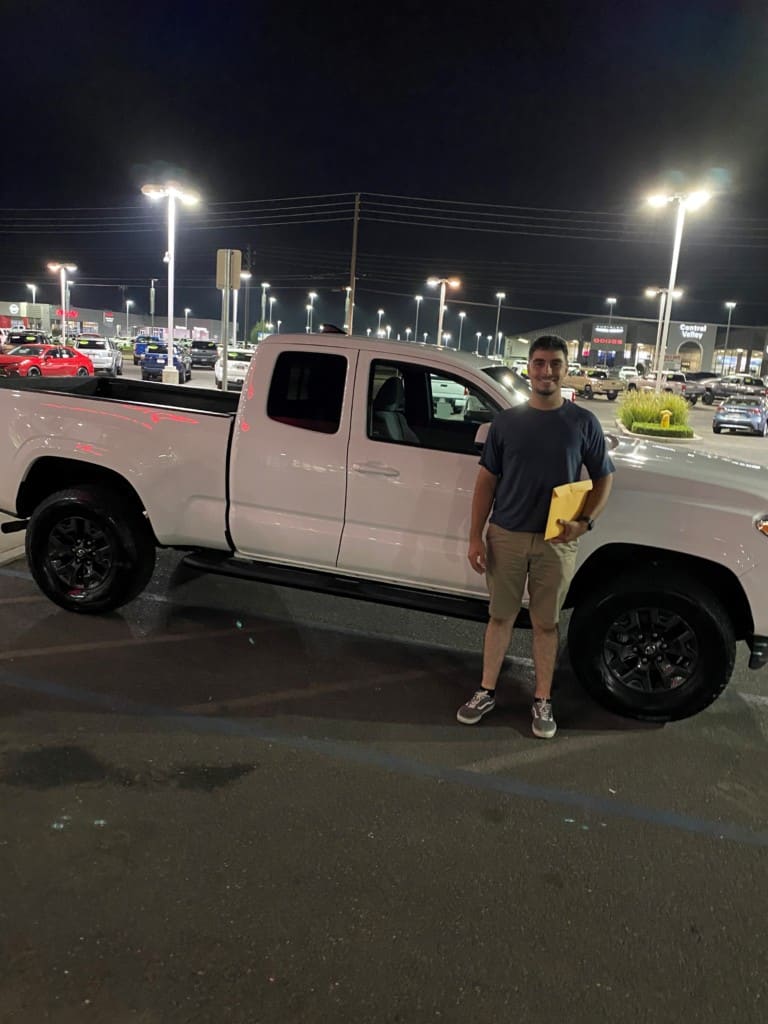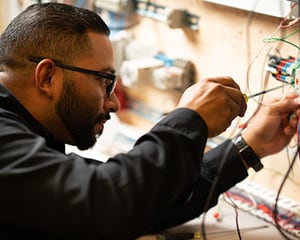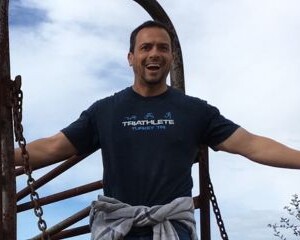Grad Q&A with Electrical Technology graduate Max Bugarin
At 17-years old Max Bugarin thought his future career was set. After graduating high school, he would attend Columbia University and eventually teach History in a local high school classroom. But one day he had a spark of intuition that led him onto a different career path. It came to him in a dream. Literally.
It was just about a year ago when he awoke from a nap and told his mom, Maria, about his new vision of a career as an electrician. She advised him to look up some schools (Electrical Technology programs) online. Max’s dad, Gerardo, had a less enthusiastic response. Max had a hard-sell to make.
Why did your dad hesitate to support your interest in an Electrical Technology career?
My dad wanted to see me in a suit and tie and kept telling me I was smarter and could do better. But I didn’t like the idea of sitting in an office working with numbers and writing a bunch of reports and feeling stressed. You should be free to do what you love and find peace in it, instead of a job your parents want for you.
My dad is the one that motivated me the most to put your work ahead of comfort. This is the kind of work that I could feel that way about. I knew he would come around.
What kind of work experience did you have at that point?
My dad has always been a foreman on a farm, and I grew up doing farm work, feeding farm animals and working irrigation and agriculture. My first actual job was at eighteen when I worked at an Amazon facility where I started as a warehouse person. Within two months I became a Learning Ambassador where I got to teach newcomers how everything worked and what Amazon expected. I wanted to learn everything. I’m a risk-taker like that.
Why Electrical Technology?
I like working with my hands and I like building stuff. Since I was little, I used to mess a lot with my toy cars and the wiring. I was always fascinated by the data boards’ little wires. My mom would get mad at me because I would tear apart my cars just to reconnect the wires.
I have good common sense I learned from tagging along with my dad on the dairy farm where there are animals that have to be fed, jobs to be done. I was never inside the house playing video games or on my phone.
How did you connect with SJVC in Modesto?
SJVC was the first one that popped up online and it the campus was just 20 minutes away. Within 5 minutes of checking “I’m interested” SJVC called. Wow, I was shocked! They told me about the student success rate, good teachers, and how the trade can open up new experiences. What you want to hear from a school. And they actually help with your job search – that’s what really got my attention.
Did you compare this ‘trade’ education to state and community college career paths?
You hear stories about going and getting a college degree and end up working in a general store, gas station or in a job you hate. No passion, no motivation to go to work. I didn’t want that.
I see other friends who didn’t really want to get a degree in Psychology or Sociology, but their parents did it. Now they’re stuck with a degree, saying, ‘What am I going to do with that?’ and feeling like it’s time and money wasted and didn’t really get them anywhere.
You enrolled in SJVC’s Electrical Technology program soon after checking it out. Any surprises?
Teachers were supportive and would kind of sit back a little and make us think. When we messed up, they would tell us where we went wrong, because everyone learns better through their mistakes. It was a frustrating, but very effective, method.
The amount of hands-on experience and getting to keep all the tools that were provided was a surprise – and I still use those tools.
What kind of support did you get from the Electrical Technology faculty?
I was working part-time (8-hour graveyard shifts) at Amazon and for an electrical company (started work there 2-modules prior to program completion), plus school, and I never had enough sleep. Mr. Lozano (faculty) was understanding and he set up some afternoon classes for everybody who needed to catch up. Other students were interested to hear about my work in the field and I would tell them, ‘Hey, I pulled wire today and had a great day at work’. It just made for a good environment.
What was one of the best things about your program experience?
The teachers have been in the field and have real-world perspective of how a foreman will talk to us and how they have the expectation that we know what we’re doing. Mr. Lozano told us how it was going to be, so I went to work kind of knowing what to expect and confident I could put my knowledge to work.
My coworkers tell me, ‘You’re in the greatest spot you can be. If I’d known about this (SJVC’s ET) program when I was your age, I would’ve done that’.
How did your job search go after you completed your program?
The Career Services department helped me get my resume out and I got a few calls and three job offers. My dad told me not to say ‘yes’ to the first job offer I get, but to look at different companies. I listened to him and that’s how I got with Barnum and Celilo Electric., Inc. as an Electrician Apprentice. I went to work for them in May before I even completed the ET program.
What are your position responsibilities?
At my first job site I was paired with wire-pulling crew for a couple of months, working above/below ground using conduit to switch-gear panel. I’ve been at the second site for three months where I’m also in charge of material management and tell the foreman what materials we need to keep the crew going.
My dad, being a foreman, too, taught me how to communicate with people, how to keep your composure and talk with coworkers in a way that gets things done.
With any job you start at the bottom, but I trust this company with knowing I feel comfortable with them and them sending me anywhere because I like to meet new crew and learn stuff. Each and every day it’s something different, and I love going to work every day.
Do you feel the level of success you hoped to enjoy?
Even before my 90-day probation ended my foreman came up and told me I was a good worker and how when people tried to slow me down, I would pass through them and keep working. He gave me a $2.00/hour raise. Coworkers were cheering me on, and it felt good to know I’m walking forward, not backwards.
I’m still learning. When they say, ‘Hey, do you want to learn this?’, I say, ‘Teach me and I’ll try my best.’ You know, Teach a man to fish and he’ll have food forever. I want to know how to fish.
 At 18-years old you’ve accomplished a lot. How did you reward yourself?
At 18-years old you’ve accomplished a lot. How did you reward yourself?
I bought my first truck. It’s a 2017 Toyota Tacoma, 4-cylinder. Not a lot of power, but it gets me from Point A to Point B, there’s room to put tools and equipment in and it’s good on gas to get me to work.
What did you have to sacrifice to get where you are now?
My role model is my dad because his work ethic is extraordinary. Mom and Dad always told me, ‘Nothing is free in this world’, but they have obviously been there for support.
I paid for my own college, my own car and gas. I wake up at 3:00 AM and commute 55 miles to work because I love what I do.
How do you imagine your future?
My dream would be to have my own company and have maybe 50 people working with me. I want to see trucks with my company name on them. My dad was still 50/50 about my career choice until I told him about wanting my own business someday. Now tells me his ideas about my future business.
In the past, his message has always been ‘You’re going to sink or you’re going to float’. I would say that I’m not floating yet, but I’m swimming. And there will be no sinking.
You might also like
More stories about
Request Information
All fields using an asterik (*) are required.


